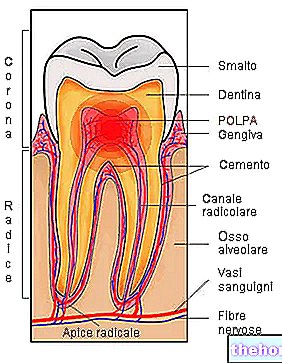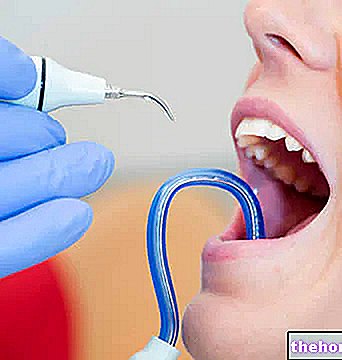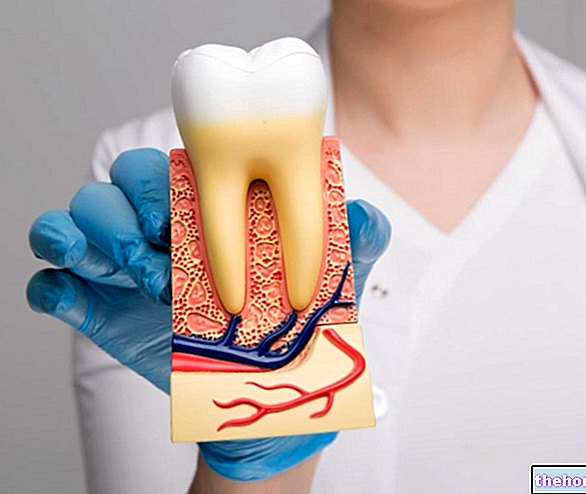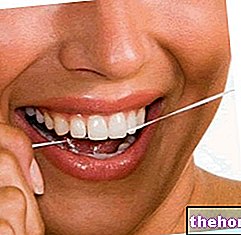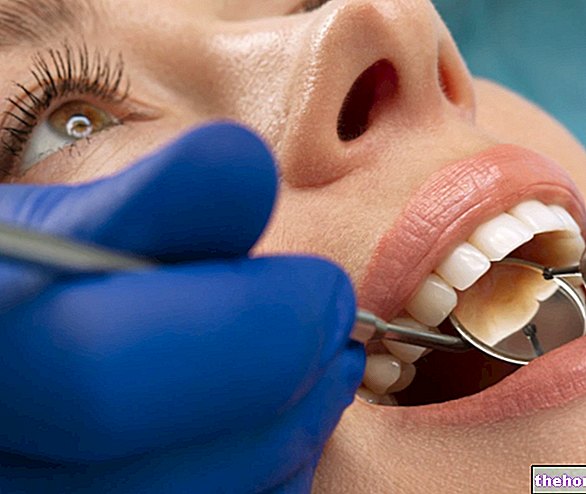What is a Dental Capsule?
The term "capsule" is used in the dental field to indicate an artificial dental crown (also defined as a "prosthetic crown"), consisting of an extremely resistant metal core and a glossy resin or ceramic coating.

Indications
When is the use of the Dental Capsule indicated?
The dental capsule is indicated in the following circumstances:
- The tooth is affected by extensive and deep caries, and cannot be healed by simple filling.
- The tooth is seriously compromised by infections of the dental pulp (pulpitis).
- The tooth is chipped, broken or seriously damaged: in such circumstances it is necessary to intervene to improve the aesthetics of the smile.
- The tooth is extremely fragile and prone to breaking.
- Tooth enamel was severely and irreparably damaged.
- The tooth has been devitalized and needs a new artificial crown.
- Cover a dental implant.
- Dental diseases that lead to the progressive flaking of the dental enamel.
Application
Before proceeding with dental encapsulation, it is necessary to remove the natural crown of the damaged tooth - the portion of the tooth that protrudes from the socket - in order to create the appropriate space to insert the dental capsule.

- After having removed the damaged natural crown with special burs, the dentist makes a "dental impression: a model of the tooth is obtained from the patient's dental cast which, sent to the laboratory, will then be used to perfectly construct the size of the capsule.
- Subsequently, a temporary dental capsule is applied to the patient, made of acrylic resin (waiting for the final capsule to be built in the laboratory by the dental technician).
- Before completing the (definitive) dental capsule, the patient is called to the dental office to evaluate, together with the doctor, the shape and color of the new crown. The capsule, in fact, must have the same shape as the removed crown and the same color as the other teeth. Just to give an example, it would not make sense to insert a white and shiny dental capsule on yellow teeth or a color more charged than the much sought-after whiteness. The ideal shade of the capsule is decided together with the dentist, using the aid of a standard colorimetric scale which will serve as a model. Alternatively, tooth staining can be measured using a special spectrophotometer.
- Once ready, the capsule must be tested directly in the patient, so that it can possibly be retouched or modified before being permanently fixed.
- When it has been perfectly defined and modified, the capsule can be cemented into the tooth.
Did you know that ...
The teeth of each individual have their own and characteristic color that does not necessarily correspond to the pure and bright white constantly present in many advertisements for products intended for the care and cleaning of the teeth (toothpastes, whitening pens, mouthwashes, etc.).

For this reason, it is completely useless to expect the creation of absolutely white "advertising" capsules, since the result in these cases would be decidedly unaesthetic.
In this regard, it should be emphasized that, in these cases, it is always good to listen to the opinion of the dentist and the dental technician who - being professionals of the trade - will certainly be able to advise the patient in the best possible way.
Capsule Materials and Types
A dental capsule can be made of different materials, depending on the cases and the different needs of each patient.
Depending on the materials used, it is possible to distinguish different types of caps which will be briefly described below.
Metal-ceramic dental capsule
The metal-ceramic dental capsule is composed of two sections: an "internal metal framework, extremely solid and resistant, and an external coating that can be composed of different materials."
In detail, a dental capsule of this type is made up of:
- A "core - whose function is to offer a certain solidity and resistance to the tooth - made up of precious metal alloys (based on gold or platinum) or less precious alloys, such as those in chromium-cobalt.
- An outer shell made entirely of ceramic (feldspar ceramic). The function of the capsule coating is twofold: to give the tooth an excellent aesthetic and to ensure a resistant and solid chewing surface, comparable to that of natural dental enamel.
Dental capsule in metal-free ceramic
A metal-free ceramic dental capsule is a particular type of prosthesis completely devoid of the metal component. This type of capsule allows for better aesthetic results than metal-ceramic ones.
In turn, the metal-free ceramic capsules are divided into:
- All-ceramic capsules, mostly composed of lithium disilicate;
- Zirconium-ceramic capsules, composed of a "rigid core of zirconium oxide, an innovative material with surprising resistance and aesthetics, which is associated with an external part made of ceramic.
Metal-composite dental capsule
Metal composite dental capsules consist of a metal core and a composite resin coating.
This type of capsule is generally not used in dental encapsulations, but in implantology, which however will not be discussed in this article.
Other types of dental capsules
In addition to those described so far, there are also other types of dental capsules. Among these we find the metal-resin capsules. An example of this type of prosthesis is represented by the capsules composed of a combination of gold and resin, in which the chewing part is entirely made of gold; while the aesthetic part (dental veneer) is made of resin.
Another type of dental capsule is the one made entirely of metal, usually gold.
However, both of the aforementioned types of capsules are obsolete and are no longer used.
Finally, there are also capsules made entirely of resin, the use of which is mostly reserved for temporary crowns.
Results
The success of the creation of a dental capsule depends first of all on the skill of the dentist in determining the correct color of the patient's teeth and, subsequently, on the skill of the dental technician in recreating the same color, as well as the characteristic lines of the tooth to be encapsulated. .
More precisely, the dental technician will not only have to recreate the proportions and shapes of the tooth to be encapsulated, but will have to customize the capsule in order to adapt it to the dental physiognomy of each individual patient.
If the dentist and dental technician collaborate and work correctly, the final results will certainly be excellent and the patient will certainly be satisfied with the work. A well-made capsule, in fact, will go unnoticed and no one will realize that the crown of the natural tooth has been replaced with a dental prosthesis.
Disadvantages
Fortunately, the disadvantages of dental capsules are not many.
A first disadvantage is represented by the hardness of the dental capsule. These prostheses, in fact, can break or chip more easily than a natural tooth. For this reason, it is advisable to avoid or at least limit the intake of crunchy and hard foods such as nougat, dried fruit or hard candies. In case of breakage or loss of the capsule (however remote event) it is necessary to contact the dentist as soon as possible , which will provide for a reception of the same.
Cost of a dentele capsule
The second disadvantage, however, is represented by the cost of the prosthesis in question. Remaining in the "field of" dental encapsulation, in fact, the price of the application of a capsule generally exceeds 400-500 euros.
However, remember that a metal-ceramic dental capsule usually has a lower cost than metal-free ceramic caps.
As for the application of a dental capsule in the field of implantology, however, the price will be significantly higher, since the cost of the implant (about 1,000 euros) must be added to the cost of the single dental capsule (400-550 euros).
Precisely with regard to the high costs of applying a dental capsule, it is important to remember how important it is to contact only and exclusively specialized doctors and professionals in the sector, without being misled by those who offer treatments at excessively low prices, since you can potentially expose you to serious health risks (development of infections, contraction of pathologies, damage to the encapsulated tooth, etc.).
Treatment
Useful tips for the care of the Dental Capsule
Similar to natural teeth, capsules also require "thorough dental hygiene. The encapsulated tooth must" be brushed and cleaned just like a natural tooth:
- Brush your teeth with toothpaste and toothbrush three times a day and after each snack
- Beware of toothpastes that are too aggressive for tooth enamel
- Limit the intake of coffee, tea and chocolate (useful for keeping teeth white and preventing stains on the teeth)
- Floss at least once a day
- Not smoking
- Daily dental hygiene must be supported by professional dental cleaning (scaling) once or twice a year
Conclusions
To conclude, remember that even an encapsulated tooth can be decayed: plaque and tartar can accumulate on the gum line, creating periodontal diseases (eg pyorrhea) and cariogenic processes such as to require dental intervention.
Dental capsules require periodic and specific checks every 6-12 months.


